MEDNEWS 01/2022
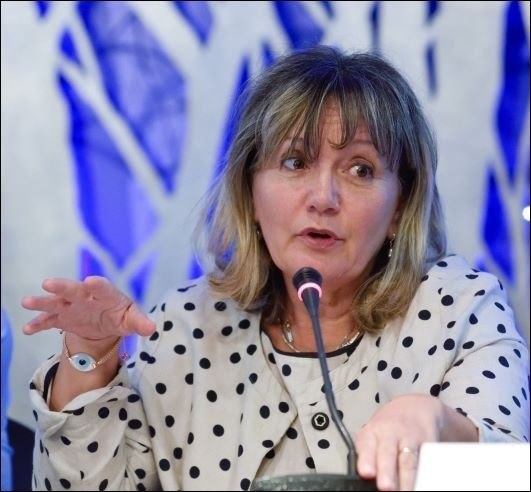 Reflections in the aftermath of a memorable COP of the Barcelona Convention
Reflections in the aftermath of a memorable COP of the Barcelona Convention
By Tatjana Hema, UNEP/MAP Coordinator
It has already been five months since the 22nd Meeting (COP 22) of the Contracting Parties to the Barcelona Convention and its Protocols held in the coastal city of Antalya, Turkey.
This was a monumental “COP for the Mediterranean”: it marked 45 years of constructive and forward-looking regional collaboration and solidarity under the UNEP/MAP-Barcelona Convention system and delivered a package of action-oriented decisions to protect the Mediterranean marine and coastal environment and bolster sustainable development.
I am grateful to our host country, Turkey, and the Contracting Parties’ representatives who made COP 22 happen despite the challenges linked to COVID-19 and, above all, for reaching concrete agreement on key decisions of major importance to MAP and the region. We look forward to the adoption of the Contracting Parties’ decision on the Designation of the Mediterranean Sea, as a whole, as an Emission Control Area for Sulphur Oxides (MED SOx ECA) pursuant to MARPOL Annex VI by the relevant IMO bodies. This represents without any doubt a groundbreaking achievement we should all be proud of. Its implementation is expected to generate significant benefits for human health and for the integrity of ecosystems, which both suffer from harmful SOx emissions from the maritime transport sector, one of the pillars of the blue economy in the Mediterranean.
On biodiversity, COP 22 adopted the Post-2020 Strategic Action Programme for the Conservation of Biodiversity and Sustainable Management of Natural Resources in the Mediterranean Region (Post-2020 SAPBIO). This achievement was complemented with agreement on a Post-2020 Regional Strategy for protecting and conserving the Mediterranean through well connected and effective systems of marine and coastal protected areas and other effective area-based conservation measures. On 20 May 2022 I will attend a high-level regional event co-organized by SPA/RAC and our partners in Monaco to mark the first edition of SPAMI Day (15 April).
Other decisions that were introduced in Antalya take aim at land- and sea-based pollution, including plastic. The Regional Plan on Marine Litter Management was substantively updated to streamline and apply circular economy principles with a focus on plastic and microplastic pollution. By adopting the updated Plan at COP 22, the representatives of 21 Mediterranean countries and the EU had sent an encouraging signal ahead of the resumed session of UNEA 5, which eventually reached a historic resolution regarding the set-up of a global treaty on plastics.
COP 22 also adopted ambitious legally binding measures and timeframes for their implementation to prevent marine pollution from wastewater and sludge generated from the operation of wastewater treatment plants with the ultimate objective to minimize pollution form these sources, achieve good environmental status and enhance the environmental performance of the management of these important sectors in the region.
The Contracting Parties also adopted a set of regional measures to support the development of green businesses and to ratchet up demand for more sustainable products. These measures will, I am sure, trickle down to many sectors of the Mediterranean economies as they pivot towards circularity.
To cap it all, COP 22 adopted the the Medium-Term Strategy (MTS - 2022-2027) that aims to achieve transformational change and contribute to bend current trajectories. The effective implementation of the Strategy will situate our region on a path of sustainability. The Antalya Declaration brings a strong expression of political support to this collective endeavour.
What COP 22 delivered is substantial. Ensuring that decisions are translated into action remains our priority as the proud custodians of the multilateral process that has delivered the Barcelona Convention in 1976 and the unique legal, institutional and implementation framework that the UNEP/MAP-Barcelona Convention system constitutes.
The next few months will see major meetings on the global environment and sustainable development taking place with crucial agendas and much at stake. We at UNEP/MAP are working with our Contracting Parties and partners to ensure an adequate presence for the Mediterranean. This region has so much to offer in terms of achievements and lessons learned but is also capable to absorb best practices from elsewhere
As I told UNEP colleagues in this Q&A on the legacy of the 1972 Conference on the Human Environment, my wish is that the Stockholm+50 conference (to be held on 4-5 June in the Swedish capital) will give new impetus to multilateralism and solidarity, strengthen the implementation of commitments and galvanize multi-stakeholder cooperation to address the triple planetary crisis. We can no longer afford to work in silos or compete for resources. At the national level, we need everyone to contribute, including the private sector which must be at the forefront of the collective endeavor for sustainability and resilience. It is time for implementation on the ground to deliver on commitments.
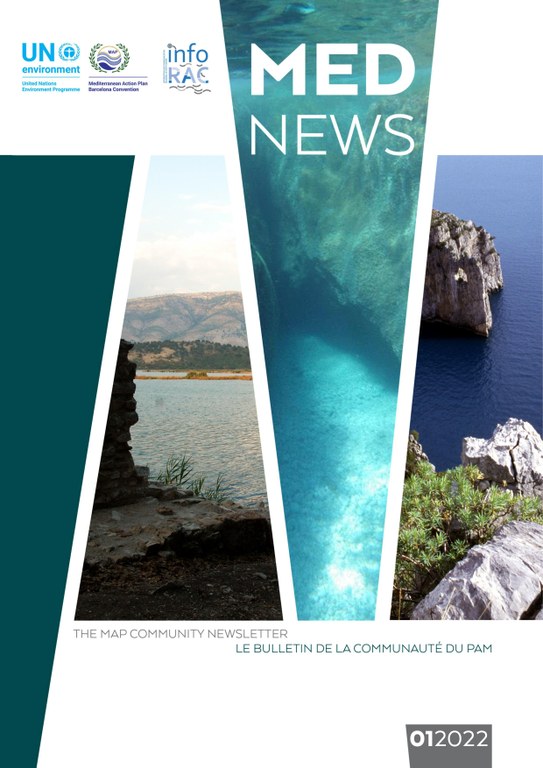
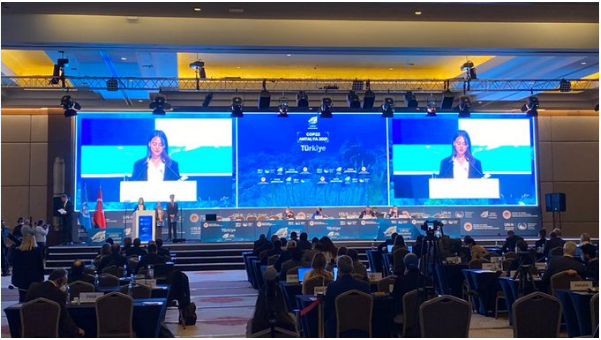
SCP/RAC at COP22: taking the pathway towards a sustainable future, grounded in eco-innovation and sustainable business models
COP22 as seen by the SCP/RAC: we have created a Twitter moment bringing together all the key moments, which you can find here.
During COP22, a series of promising and encouraging decisions on circular economy, driven by the SCP/RAC, have been adopted by countries, contributing to regional efforts aimed at a green recovery in the Mediterranean. As a first step, countries ...
During COP22, a series of promising and encouraging decisions on circular economy, driven by the SCP/RAC, have been adopted by countries, contributing to regional efforts aimed at a green recovery in the Mediterranean. As a first step, countries adopted the very definition of the term “sustainable business”, acknowledged by the countries as key drivers for the Green and Blue Economy in the Mediterranean region. While all businesses must adapt to their political, social and economic context and operate within regulatory and institutional constraints, green and circular economy businesses often face additional challenges such as establishing a secure foothold in the market, staying competitive with other businesses that do not internalize the costs of environmental and social responsibility, limited opportunities for building capacity on sustainable business practices, and access to financing. The definition, based on a first proposal made by Burcu Tuncer and Giorgio Mosangini (Circular economy business strategies, 2020), is an important step in the work to promote harmonization of policies and approaches among regional actors.
With the same objective, the countries then adopted a set of 12 Regional policy measures presented by SCP/RAC, to support green and circular economy businesses in the Mediterranean. This measure is expected to increase the adoption of eco-innovation techniques among businesses, generate new green jobs and strengthen demand for more sustainable products, acting as a stepping stone in consolidating the countries efforts towards a more circular Mediterranean.
All these measures come to provide additional and elementary support to the Switchers, a community hosted by SCP/RAC, of more than 300 entrepreneurs and change makers leading the shift to green and socially inclusive economies in the Mediterranean. Flag bearer of the Switchers during this COP22, the catalan entrepreneur Aina Pujol conveyed a message to the participants: “The youth of the Mediterranean have the common will to make change, but lack the resources”. She took part in the Ministerial Session as Youth representative alongside H.E. Mr. Murat Kurum, Minister of Environment, Urbanization and Climate Change of the Republic of Turkey and Ms. Joyce Msuya, Deputy Executive Director of UNEP, who congratulated Aina Pujol and the other two youth representative Faik Yetkin from Turkey and Asma Tarek from Egypt “on their efforts for the people and for the planet” stating that “They are shining examples of the power of youth to help protect the Mediterranean Sea”.
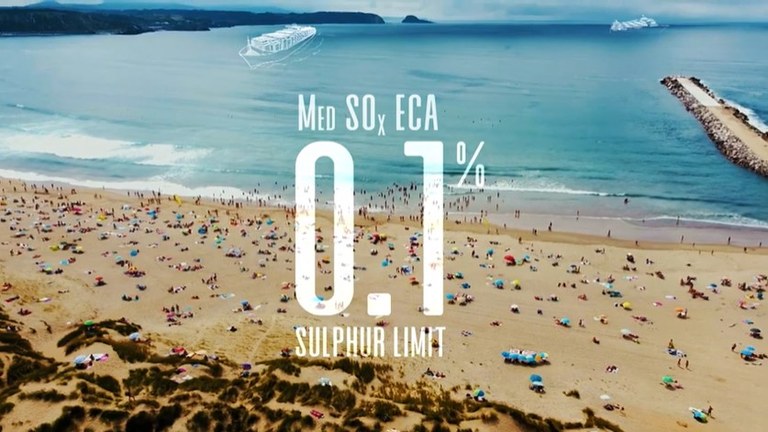
COP 22 secured consensus on curbing emissions of Sulphur Oxides from ships in the Mediterranean
COP 22 adopted a ground-breaking decision on the Designation of the Mediterranean Sea, as a whole, as an Emission Control Area for Sulphur Oxides (Med SOX ECA) pursuant to Annex VI to the International Convention for the Prevention of Pollution from ...
COP 22 adopted a ground-breaking decision on the Designation of the Mediterranean Sea, as a whole, as an Emission Control Area for Sulphur Oxides (Med SOX ECA) pursuant to Annex VI to the International Convention for the Prevention of Pollution from Ships (MARPOL).
This decision is the culmination of intense consultations among the Contracting Parties to the Barcelona Convention that were facilitated by UNEP/MAP and two of its Regional Activity Centres, namely REMPEC and Plan Bleu.
It cleared the way for the submission on 4 February 2022, by France, currently holding the Presidency of the Council of the European Union, of the joint and coordinated proposal on the designation of the Med SOX ECA, on behalf of all Mediterranean coastal States, along with all EU Member States, and the European Commission, for consideration at the 78th session of the International Maritime Organization (IMO)’s Marine Environment Protection Committee (MEPC 78) (6-10 June 2022).
Once designated, the Med SOX ECA is expected to generate significant benefits for human health and for the integrity of ecosystems, which both suffer from harmful SOX emissions from the maritime transport sector, one of the pillars of the blue economy in the Mediterranean.
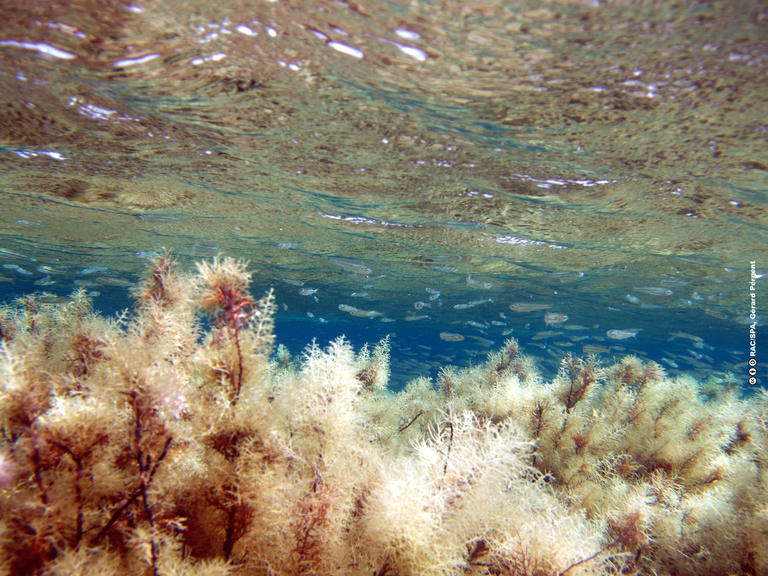
Focus on COP22 follow up
During COP 22, the significant role of ICZM Protocol of the Barcelona Convention as a legal milestone for embedding and implementing integrated approaches, practices and tools into common initiatives and coordinated actions among sectors and ...
During COP 22, the significant role of ICZM Protocol of the Barcelona Convention as a legal milestone for embedding and implementing integrated approaches, practices and tools into common initiatives and coordinated actions among sectors and improving existing governance mechanisms was reconfirmed through the Antalya declaration.
Namely, the Contracting Parties pledged to widen their engagement in active dialogue and promote common initiatives, supporting regional responses to shared environmental challenges in order to amplify their impact across and beyond the basin, and contributing to coordinated action across sectors and levels of government through the implementation of integrated approaches stipulated in the Protocol on Integrated Coastal Zone Management and the Conceptual Framework for Marine Spatial Planning.
This statement reconfirmed the importance of implementing Marine Spatial Planning across the Mediterranean Region to better protect marine ecosystems by strategically allocating the use of marine areas and working together to reduce conflict and improve coastal (and marine) governance.
The example from the GEF Adriatic project presented during one of the most visited side events confirms that the ecosystem approach is rightly the dominant paradigm for marine and coastal planning. But real-world MSP has to deal with the real political and institutional competencies, complex participation issues, sectoral trade-offs and blue growth priorities. With the approach developed within the GEF Adriatic project, based on IMAP and tested in Montenegro, PAP/RAC is providing a visual tool, based on scientific data that provides objectively verifiable bases for decision making processes based on environmental priorities.
All this shows that the efforts of PAP/RAC in promoting holistic approached looking at the integrity of coastal ecosystems in its land and sea scope, as defined in Art. 3 of the ICZM Protocol, is pushing the ecosystem approach in the Mediterranean to a next level.
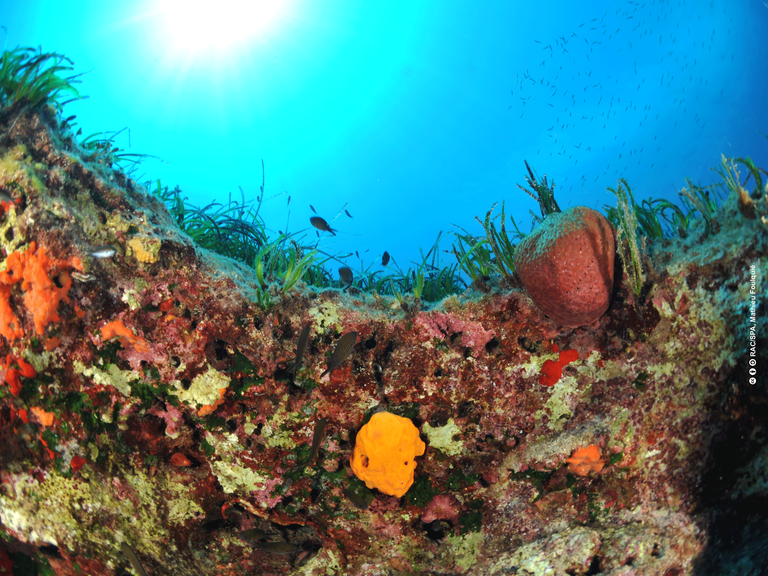
Barcelona Convention COP 22 adopts bold measures for biodiversity conservation and natural resources sustainable use in the Mediterranean
The Contracting Parties to the Convention for the Protection of the Marine Environment and the Coastal Region of the Mediterranean (Barcelona Convention) and its Protocols concluded their 22nd meeting (COP 22, Antalya, Turkey, 7-10 December 2021) ...
The Contracting Parties to the Convention for the Protection of the Marine Environment and the Coastal Region of the Mediterranean (Barcelona Convention) and its Protocols concluded their 22nd meeting (COP 22, Antalya, Turkey, 7-10 December 2021) with a set of action-oriented decisions for biodiversity conservation.
“There is a wealth of solutions that can be built upon to halt biodiversity decline. But for this to work, the political will is the utmost condition. Through the adoption of bold decisions and the Antalya Declaration, the countries emphasized their support for the collective effort within the framework of the UNEP/MAP-Barcelona Convention system to achieve a healthy Mediterranean Sea and coast in the context of sustainable development”, Khalil Attia, SPA/RAC Director.
The COP 22 adopted notably the Post-2020 Strategic Action Programme for the Conservation of Biodiversity and Sustainable Management of Natural Resources in the Mediterranean Region (Post-2020 SAPBIO). “The Post-2020 SAPBIO is a strong achievement for the Contracting Parties to the Barcelona Convention. It constitutes the blueprint for the conservation of the Mediterranean for the next 15 years.”, Daniel Cebrian, SAPBIO Programme Officer, SPA/RAC.
The Post-2020 SAPBIO proposes a long-term Vision to 2050, adapted from the Global Biodiversity Framework to be finalized in 2022 under the UNCBD: “By 2050, marine and coastal biodiversity is valued, conserved, restored and wisely used, maintaining ecosystem services, sustaining a healthy Mediterranean Sea and coast, and delivering benefits essential for all people”.
Developed by UNEP/MAP-SPA/RAC following a fully participative regional bottom-up process, the Post-2020 SAPBIO proposes activities tailored towards realistic objectives and targets that countries could reasonably achieve with the coordination of relevant international organisations and the support of donors and funding agencies.
The Post-2020 SAPBIO is complemented by other measures, also adopted by COP 22, which should contribute to achieving conservation goals in the region. These include the Post-2020 Regional Strategy for marine and coastal protected areas and other effective area-based conservation measures in the Mediterranean (Post-2020 MCPA & OECM Strategy). “It is an important document that would bring the Mediterranean to meet global CBD objectives. For the time being, we are far away from the 30% protection coverage by 2030. So far, we are at 8,33% of marine protected areas coverage in 2020”, Souha El Asmi, Specially Protected Areas Programme Officer, SPA/RAC.
The Post-2020 MCPA & OECM Strategy sets key actions to increase the protection coverage, including through the identification and reporting of “other effective area-based conservation measures” (OECMs). The proposed actions also aim to enhance governance within MPAs, improve their management effectiveness, and provide guidance on how to engage governments and other stakeholders to make MPAs successful.
A new initiative, adopted by COP 22, will further promote MPAs as an important tool for biodiversity conservation and management. From 2022, the celebration of the Specially Protected Areas of Mediterranean Importance Day (SPAMI Day) will take place on 15 April each year.
On species and habitats conservation, COP 22 adopted two updated Action Plans for the conservation of cetaceans and dark habitats under the Protocol concerning Specially Protected Areas and Biological Diversity in the Mediterranean. The updates aimed notably to strengthen the regional and national efforts and actions as well as the coordination and synergies among the conservation stakeholders in the region.
This year's COP 22 marked 45 years of regional cooperation dedicated to the marine and coastal environment and sustainable development in the framework of the Barcelona Convention. Over 400 participants from Contracting Parties and representatives from UN agencies, intergovernmental and non-governmental organizations, research institutions, donors, the private sector, and civil society organizations attended the four-day meeting. A number of side events took place on the sidelines of the COP and were an opportunity to share the best conservation initiatives, in the spirit of sharing/exchanging in a collaborative spirit.

RESET is born, a new EU-funded project to facilitate the creation of green and sustainable businesses in the Mediterranean
The Regional Activity Center for Sustainable Consumption and Production (SCP/RAC) is the leader of the project and main partner, which will be in charge of the regional dissemination of the project learnings.
SCP/RAC is leading a new European ...
The Regional Activity Center for Sustainable Consumption and Production (SCP/RAC) is the leader of the project and main partner, which will be in charge of the regional dissemination of the project learnings.
SCP/RAC is leading a new European project to support the creation of green and sustainable businesses in the Mediterranean. RESET (RESults Enabling Transitions) is an EU-funded project through the ENI CBC MED Programme and is managed by five partners located in different countries in the North and the South of the Mediterranean Basin.
Besides SCP/RAC, other partners take part of the project such as Beyond (Lebanon), PIN S.c.r.l. Educational and Scientific Services for the University of Florence (Italy), Leaders Organization (Palestine) and INJAZ Tunisia (Tunisia). RESET also has seven partners in countries such as Spain and Greece, including UNEP/MAP, or the Balmes University Foundation (University of Vic).
RESET aims to facilitate economic and social development via supporting the creation of sustainable and green businesses. The project will identify and analyse the most successful practices that can further be capitalized on and optimized at project, local, national, and regional level across the Mediterranean. It will gather and synthetise learnings regarding 'what works’ within the field of sustainable and green business support, and seeks to upstream this knowledge in order to support green business creation.
The project will have a duration of 24 months (estimated end on 12/2/2023), during which it will seek to offer support to green entrepreneurs through training in partner countries, in addition to promoting the creation of public policies with a series of regional measures for the development of green and circular businesses.
On the one hand, the project will produce a research-based need/knowledge map and one innovative database management system. In this regard, it will offer support to and build capacity of EU project stakeholders through 1 capitalisation ‘clinic’, both on a local and regional level. In addition to this, RESET will offer online and face-to-face training to ensure the capitalization of the ground successful practices reaches the green entrepreneurs.
On the other hand, strategic papers to guide green business development strategies will be developed and a Virtual Community of Practice to gather the relevant stakeholders will be created. Last but not least, there will be an award of € 54.000 to showcase the work and stakeholders of RESET and to highlight the importance of capitalisation of EU projects.
This project is the result of many years of experience of the SCP/RAC in supporting eco-innovation in entrepreneurs and SMEs. The Barcelona-based centre is the origin of pioneering initiatives through which the provision of training services, coaching and advice, dialogue on policies, networking and access to financing have been provided.
RESET is an EU-funded project with a total budget of 1€ million, with an EU contribution of 900.000€. In recognition of the Mediterranean accelerating employment and environmental crises, there are various calls for action to create a sustainable and inclusive economy that works for everyone. As the region thrive towards developing and implementing measures for a sustainable green transition, RESET aims to play a key role to facilitate economic and social development via supporting the creation of sustainable and green businesses.
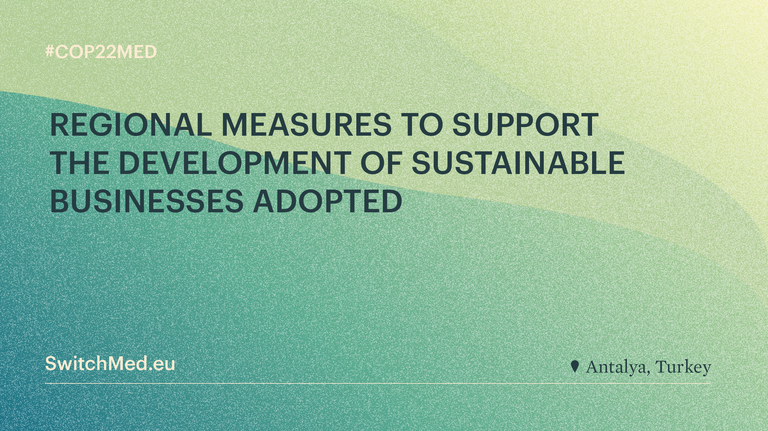
The set of regional policy measures to support green and circular businesses in the Mediterranean is now available as a publication
The measures, adopted by Mediterranean countries during COP22 of the Barcelona Convention, will contribute to the transition towards a circular, green and blue economy in the region.
The set of “Regional Measures to Support the Development of ...
The measures, adopted by Mediterranean countries during COP22 of the Barcelona Convention, will contribute to the transition towards a circular, green and blue economy in the region.
The set of “Regional Measures to Support the Development of Green and Circular Businesses and to Strengthen the Demand for more Sustainable Products” was adopted by the Contracting Parties to the Barcelona Convention (i.e. the 22 countries surrounding the Mediterranean Sea) through Decision IG 25/18 on December 2021, during COP22 in Antalya.
The Regional Measures have now been turned into a publication and made available in for anyone who needs to consult them.
This Decision has been prepared following the request of the Barcelona Convention Contracting Parties set out in COP21 Decision IG. 24/13 and all the preparatory work was conducted by SCP/RAC within the SwitchMed programme.
This set of regional measures will contribute to a number of strategic objectives of the Mediterranean Strategy for Sustainable Development (MSSD) and the Regional Action Plan on Sustainable Consumption and Production (SCP) in the Mediterranean, as well as UNEA-4 resolution nº1 on “Innovative pathways to achieve sustainable consumption and production” and nº4 on “Addressing environmental challenges through sustainable business practices” and UNEA-5.2 resolution on “enhancing circular economy as a contribution to achieving sustainable consumption and production” (UNEP/EA.5/L.17).
Regarding the background of this document, the technical work needed for the preparation of such a set of measures included an in-depth analysis of the situation for green and circular businesses at the national and sub-regional levels. The analysis led to the drafting of policy recommendations that were finally grouped under 12 regional measures, reviewed by nominated national experts and Contracting parties. All the preliminary work and specific information for each country and sub-region are available on the SwitchMed webpage dedicated to the Regional Measures.
This set of regional measures is a timely response to urgent call for a “green renaissance” and to build back better as expressed by the UNEP COVID-19 response strategy.
SwitchMed is committed to move from words to action and is already implementing some of the measures presented in the document. An example of an activity contributing to Measure B1: “Mediterranean Network of Networks of Business Support Organizations (BSOs)”) is the creation the ACT Network of BSOs. Deeply aware of the role that sustainable finance plays in supporting the creation of green enterprises, SwitchMed also launched a call to action to establish REGIONAL MEASURE F1 – “the first Sustainable Finance MED Observatory”, gathering regional financial experts and impact investors around a platform for dialogue, research and promotion of common sustainable investment solutions.
SwitchMed is also working on the creation of the Switchers Policy Hub, that represents Measure P1: “Regional Policy Hub to support peer learning on policy instruments” and will help to achieve other measures in the Mediterranean region by supporting policymakers who are working towards a circular, green and blue economy in the region.
Finally, SwitchMed is also currently organising a hybrid event and will launch a publication on Blue Economy that aims to foster the development of Circular Economy practices within selected sectors of the Blue economy in the Mediterranean, thus contributing to Measure T2: “Creating an enabling framework for sustainable and inclusive businesses within sectors of the Blue Economy”.

SCP/RAC becomes MedWaves, the UNEP/MAP Regional Activity Centre for SCP
The year 2022 marks a turning point for the SCP/RAC, the Regional Activity Centre for Sustainable Consumption and Production, one of the UNEP/MAP Component.
SCP/RAC officially changes its name to “MedWaves, the UNEP/MAP Regional Activity Centre ...
The year 2022 marks a turning point for the SCP/RAC, the Regional Activity Centre for Sustainable Consumption and Production, one of the UNEP/MAP Component.
SCP/RAC officially changes its name to “MedWaves, the UNEP/MAP Regional Activity Centre for SCP.”
After being welcomed by the Contracting Parties to the Barcelona Convention at COP22 (Antalya, December 2021), during which the new logo and name were officially unveiled, MedWaves was publicly launched on the 6th of May.
The Centre, based in Barcelona, has also released its new logo, representing a wave, symbolizing collaboration, union, progress and change. A wave made up of circular shapes portraying the cross of two paths that follow the same direction.
MedWaves (former SCP/RAC) will keep going with the good work in the Mediterranean and will keep offering focused expertise in several key areas: circular economy, marine litter and plastics pollution, toxic chemicals, and sustainable blue economy. Support services range from capacity building and technical assistance to the provision of advisory services and training. The Centre translates the knowledge contained in policy briefs and actions plans into actual programming on the ground by implementing best practices and measures.
For green entrepreneurs and small-and-medium sized enterprises (SMEs), MedWaves provides an integral business support programme, offering innovative training material, advocacy services, business and financial opportunities, knowledge-transfer and networking services to develop and scale up their sustainable business and create green jobs.
MedWaves, Converging Synergies for the Planet. Visit the new website of MedWaves and follow @MedWaves_Centre on Twitter, Facebook and LinkedIn.
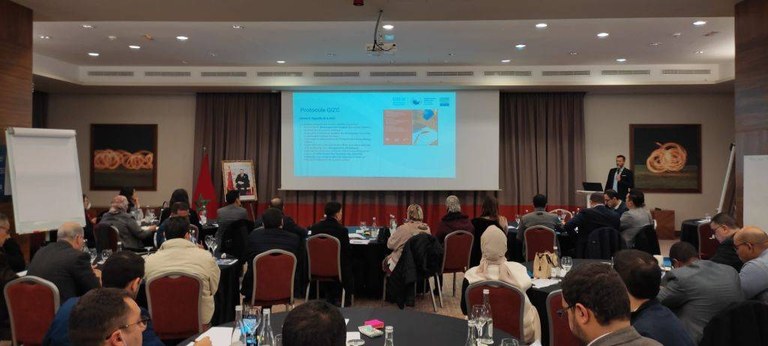
PAP/RAC in collaboration with Plan bleu launches the coastal management plan for Tanger-Tétouan-Al Hoceima in Morocco
On March 13th 2022, PAP/RAC and Plan Blue held the inception meeting for the preparation of regional Coastal plan (Schéma régional du littoral) for the region Tanger-Tetouan-Al Hoceima in Morocco. It was an inception meeting and Climagine workshop, ...
On March 13th 2022, PAP/RAC and Plan Blue held the inception meeting for the preparation of regional Coastal plan (Schéma régional du littoral) for the region Tanger-Tetouan-Al Hoceima in Morocco. It was an inception meeting and Climagine workshop, held in Tanger, Morocco, organized in the framework of the GEF MEDProgramme’s Child Projects 2.1. and SCCF. The workshop was attended by representatives of national and regional governments and relevant institutions. The preparation of the plan will be carried out through a set of participatory workshops (Climagine), enhancing intersectoral and interdisciplinary collaboration. The workshop brought out the priority topics that SRL-Coastal Plan will cover, and agreement on further actions. The elaboration of such plan will help in sustainable development of the region, but also represents an important step in Morocco’s implementation of the ICZM Protocol.
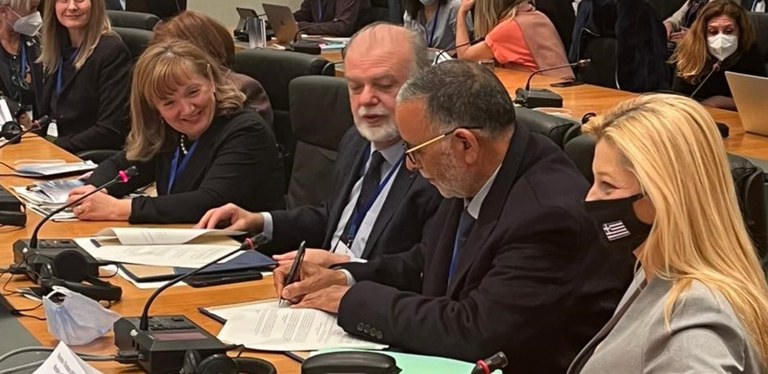
UNEP/MAP and COMPSUD step up cooperation for sustainable development in the Mediterranean region
The Mediterranean Action Plan of the United Nations Environment Programme (UNEP/MAP) and the Circle of Mediterranean Parliamentarians for Sustainable Development (COMPSUD) announced a Memorandum of Understanding aiming to foster bilateral ...
The Mediterranean Action Plan of the United Nations Environment Programme (UNEP/MAP) and the Circle of Mediterranean Parliamentarians for Sustainable Development (COMPSUD) announced a Memorandum of Understanding aiming to foster bilateral cooperation for healthy marine and coastal ecosystems that underpin sustainable development in the Mediterranean region. Tatjana Hema, the UNEP/MAP Coordinator, and Moh Rejdali, the COMPSUD Chairperson, signed the MoU at a ceremony held on 12 April 2022 in Zappeion Megaron in Athens, Greece.
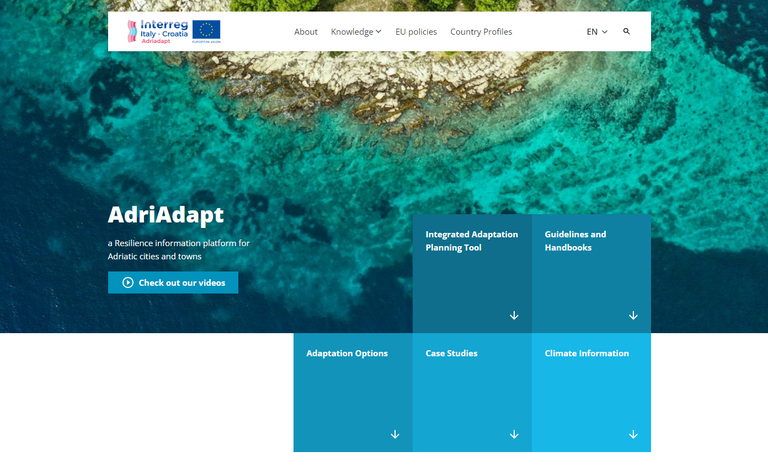
PAP/RAC launched AdriAdapt platform on adaptation to climate change!
PAP/RAC team gladly announces that the knowledge platform AdriAdapt has been completed. The platform serves primarily as an inspiration for climate action to all Adriatic cities and regions, their development agencies, but also offers ideas to ...
PAP/RAC team gladly announces that the knowledge platform AdriAdapt has been completed. The platform serves primarily as an inspiration for climate action to all Adriatic cities and regions, their development agencies, but also offers ideas to governmental, business and academic sectors.
The platform contains the following:
- integrated adaptation planning tool (step-by-step guide);
- more than 40 adaptation options;
- 11 case studies;
- climatic information for the region;
- several thematic guidelines, handbooks and guides for adaptation – from financing adaptation to enhancing coastal resilience; and
- more than 50 different videos – from short ones (5–10 minutes) to full trainings and conferences held during the project.
We particularly invite you to visit our Editor’s Picks videos!
All materials are available in English, Italian and Croatian. Although developed for the Adriatic region, the platform has been visited by users from 130 countries by now! This testifies that coastal challenges posed by climate change are similar worldwide!
We invite you to get involved into enhancing coastal resilience through climate action. Use this platform to act!
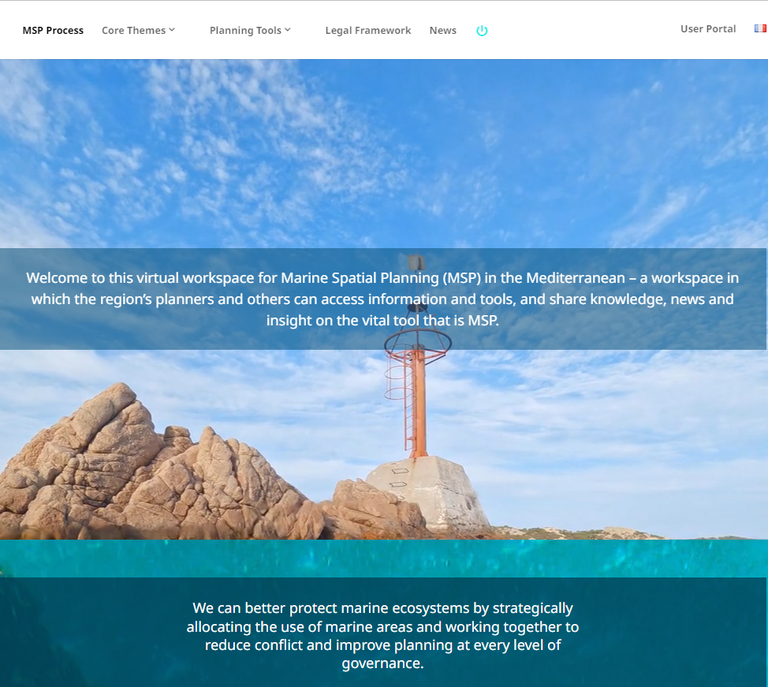
Plan smart from the start with PAP/RAC’s new Mediterranean Marine Spatial Planning Workspace
The Mediterranean Marine Spatial Planning (MSP) Workspace offers governance advice and easy access to the latest planning tools following the seven stage MSP process. It promises to be an evolving online practical guide for preparing and delivering ...
The Mediterranean Marine Spatial Planning (MSP) Workspace offers governance advice and easy access to the latest planning tools following the seven stage MSP process. It promises to be an evolving online practical guide for preparing and delivering plans that incorporate climate actions, an ecosystem approach, and land-sea interactions.
The workspace is coordinated and published by the PAP/RAC The objective is to give planners and policy makers’ quick access to the latest MSP planning information. Tools can easily be adapted to different national contexts and geographic scales, helping ministries as well as sub-national and local authorities to effectively plan. Users will benefit from following best practice tips and using the simple assessment tools to strategically allocate the use of marina areas following the ICZM Protocol.
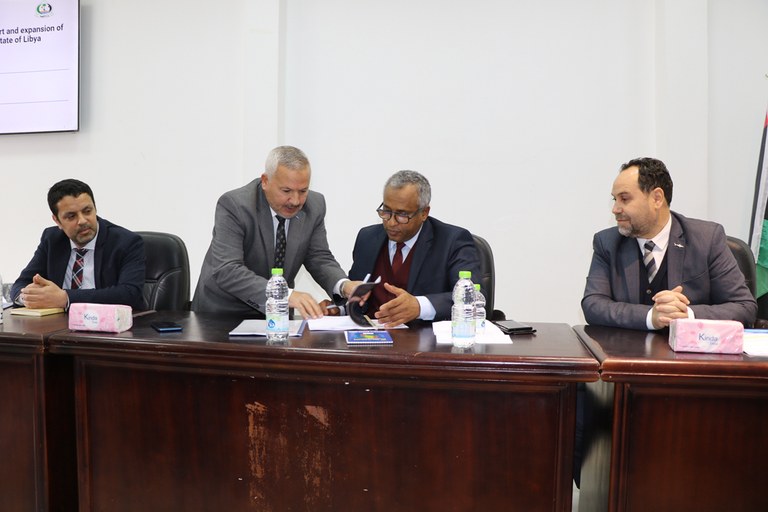
New project launched to support management and expansion of marine protected areas in Libya
The new project is being implemented as part of the MedProgramme initiative led by Barcelona Convention UNEP/MAP and funded by the Global Environment Facility (GEF).
The Specially Protected Areas Regional Activity Centre (UNEP/MAP-SPA/RAC), the ...
The new project is being implemented as part of the MedProgramme initiative led by Barcelona Convention UNEP/MAP and funded by the Global Environment Facility (GEF).
The Specially Protected Areas Regional Activity Centre (UNEP/MAP-SPA/RAC), the International Union for Conservation of Nature (IUCN) and the World Wildlife Fund (WWF) in close collaboration with the Ministry of Environment of Libya organised on Wednesday, 16 February 2022, the kick-off meeting of the project “Management Support and Expansion of Marine Protected Areas in Libya”.
The project is being implemented as part of the MedProgramme initiative led by Barcelona Convention UNEP/MAP and funded by the Global Environment Facility (GEF).
The project overall objective consists on addressing the capacity barriers that hinder the sustainability and effectiveness of the MPA network in Libya, namely through the establishment of MPA management support mechanisms in 3 priority MPAs (Ain El Ghezala, Gara island and Farwa lagoon).
This would include: (i) the assessment of the legal and institutional mechanisms for MPAs; (ii) the collection and centralization of data on marine biodiversity and ecosystems; and (iii) communication and awareness about MPAs and marine biodiversity and ecosystems.
The project will then contribute to advancing MPAs in Libya towards a phase of operational sufficiency by building the capacity of MPA practitioners and by developing management plans for 3 potential sites through a step-by-step participatory planning process to ensure the effective protection of ecological and socioeconomic values of the areas.
SPA/RAC will be particularly leading the component on improving governance and management support. This will be based on the implementation of the Libyan Protected Areas National Strategy and on finalizing the consultations and approval of the national law on protected areas.
The kick-off meeting of the project allowed a rich discussion between all governmental, research and civil society organisations representatives on the setting of a common framework towards a clear definition of the planned activities, the best mechanisms for their implementation and for the active involvement of communities and stakeholders at local levels.
The meeting has also served as an on-time opportunity where His Excellency Dr Ibrahim Al-Arabi Mounir, Minister of Environment of Libya approved the Action Plan for the Conservation of Sea Turtles in Libya and the Action Plan for Non-Indigenous species in Libya that have been prepared with the technical and financial support of SPA/RAC.
For more information on the Project, please contact Atef LIMAM Child project 3.1. Coordinator.
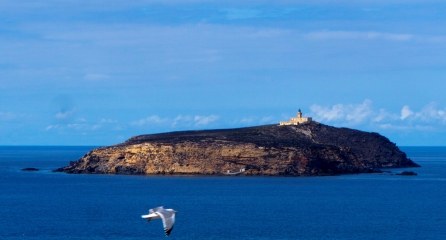
Launch of the classification of the Marine and Coastal Protected Area of Rachgoun Island in Algeria
The Commission of Protected Areas of the wilaya of Ain Témouchent has approved the request for classification of the island and has given the green light to continue and finalize the process.
The Algerian Ministry of the Environment and ...
The Commission of Protected Areas of the wilaya of Ain Témouchent has approved the request for classification of the island and has given the green light to continue and finalize the process.
The Algerian Ministry of the Environment and UNEP/MAP-SPA/RAC are collaborating for the conservation of the terrestrial and marine territory around Rachgoun (Ain Témouchent), through the classification of this area as a marine protected area (MPA).
In this context, a "study of relevance" presenting the arguments for the classification of this area was developed and presented on March 24, 2022 to the Commission of Protected Areas of the wilaya of Ain Témouchent.
The meeting with the commission was organized under the direction of the Secretary General of the wilaya of Ain Témouchent, in the presence of the Director of Preservation, Conservation and Valorization of Biodiversity and Ecosystems at the Algerian Ministry of Environment, the Director of the Environment of the wilaya of Ain Témouchent and the consulting firm ABYSS, responsible for the preparation of the classification dossier.
Following a presentation of the arguments for the protection of the island, the members of the commission unanimously approved the request for the classification of the area.
The process of protecting Rachgoun Island is being carried out based on a participatory and inclusive approach, in order to ensure the support and ownership of its conservation by all stakeholders.
The site is indeed of great socio-economic importance, especially for the local fisheries. The Posidonia oceanica meadows and the multiple crevices it shelters, offer a refuge to species with high commercial value. The area requires urgent protection, through the involvement of all the stakeholders, to guarantee its integrity and ensure the sustainable exploitation of its resources.
The next step in the process will consist on developing (i) a master plan for Rachgoun Island, (ii) a management plan and (iii) the classification study to be submitted to the Commission on Protected Areas in view of its official declaration of as a marine and coastal protected area.
It is worth noting that the classification process is part of the collaboration between the Algerian Ministry of Environment and SPA/RAC, under the aegis of the Mediterranean Action Plan in the framework of the implementation of the Barcelona Convention. The Directorate of Environment of the wilaya of Ain Témouchent in its capacity as public administration in charge of the environment in the wilaya has been designated by the Ministry of Environment as the classification "Porteur du Projet" .
In addition, the classification of Rachgoun island is supported by two regional projects namely (i) the regional project " Towards achieving the Good Environmental Status of the Mediterranean Sea and Coast through an Ecologically Representative and Efficiently Managed and Monitored Network of Marine Protected Areas" ("IMAP-MPA Project"), funded by the European Union (EU) and (ii) the regional project " Empowering the legacy: scaling up co-managed and financially sustainable No-Take Zones / Marine Protected Areas" ("NTZ/MPA Project"), funded by the MAVA Foundation.
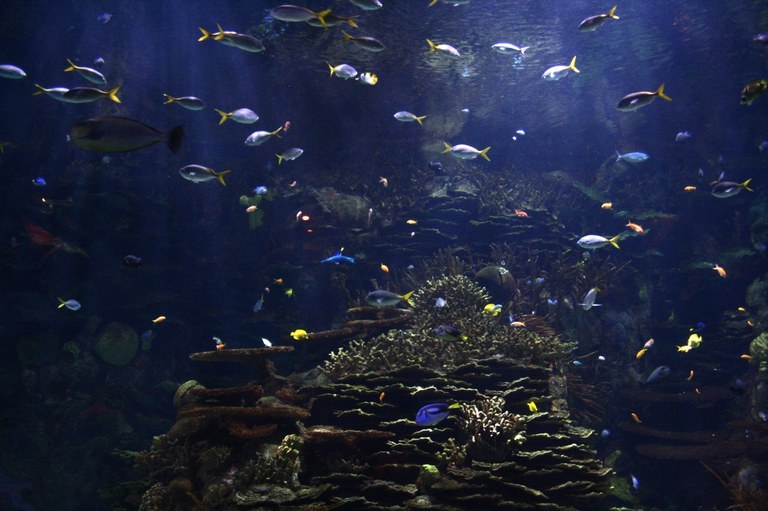
Highlights from the Mediterranean workshop at the One Ocean Summit
Several participants in the "Mediterranean 2030" workshop—which took place on 9 February 2022 in Brest, in the context of the One Ocean Summit—paid tribute to the UNEP/MAP-Barcelona Convention system’s role in facilitating multilateral action for ...
Several participants in the "Mediterranean 2030" workshop—which took place on 9 February 2022 in Brest, in the context of the One Ocean Summit—paid tribute to the UNEP/MAP-Barcelona Convention system’s role in facilitating multilateral action for healthy marine and coastal ecosystems and sustainable development in the Mediterranean region.
The opening session included high-level interventions by Bérangère Abba, Secretary of State for Biodiversity of France, Hugo Moran, Secretary of State for the Environment of Spain, and Vassilios Demetriades, Shipping Deputy Minister to the President of Cyprus.
The speakers unanimously applauded the landmark decision on the designation of the Mediterranean Sea, as a whole, as an Emission Control Area for Sulfur Oxides (Med Sox ECA), adopted at the 22nd Meeting of the Contracting Parties to the Barcelona Convention and its Protocols (COP 22 Antalya, Turkey, 7-10 December 2021). Mr. Demetriades called on the Contracting Parties to the Barcelona Convention to initiate work for the designation of a complementary Emission Control Area for Nitrogen Oxides.

SPAMI Day: a new observance dedicated to biodiversity protection in the Mediterranean
Each year on 15 April the Mediterranean region will mark a new, official observance celebrating the Specially Protected Areas of Mediterranean Importance (SPAMIs). The institution of SPAMI Day is an initiative of the Mediterranean Action Plan of the ...
Each year on 15 April the Mediterranean region will mark a new, official observance celebrating the Specially Protected Areas of Mediterranean Importance (SPAMIs). The institution of SPAMI Day is an initiative of the Mediterranean Action Plan of the United Nations Environment Programme (UNEP/MAP) and SPA/RAC, the UNEP/MAP Specially Protected Areas Regional Activity Centre, based in Tunisia. SPAMI Day was adopted by the Contracting Parties (21 Mediterranean countries and the European Union) to the Convention for the Protection of the Marine Environment and the Coastal Region of the Mediterranean (Barcelona Convention) at COP 22 (Antalya, Turkey, 7-10 December 2021).

Partnership with Fondation de la Mer: how does this new agreement support companies acting in the best interests of the ocean?
The agreement aims to promote and deploy the Ocean Benchmark and the Ocean Approved Label in the Southern Mediterranean countries as part of the ‘Switchers Support Programme’ coordinated by the SCP/RAC.
Representatives of the Fondation de la Mer ...
The agreement aims to promote and deploy the Ocean Benchmark and the Ocean Approved Label in the Southern Mediterranean countries as part of the ‘Switchers Support Programme’ coordinated by the SCP/RAC.
Representatives of the Fondation de la Mer and representatives of the Regional Activity Centre for Sustainable Consumption and Production (SCP/RAC) signed a promising new partnership in November 2021, whose main activities are about to start.
Through this partnership, the two organizations wish to increase the impact of their respective actions related to the ocean and the blue economy, as well as their actions in support of green entrepreneurship and the development of sustainable business models in the Mediterranean basin.
The Fondation de la Mer has recently developed the Ocean Benchmark, used by companies to identify, measure and reduce their environmental impact, along with an international certification dedicated to the preservation of the oceans and seas, based on the United Nations Sustainable Development Goal No. 14: the ‘Ocean Approved’ label.
Recognizing, promoting and supporting ocean-friendly businesses is at the heart of the SCP/RAC’s mission, which is reflected in one of its main programmes: ‘The Switchers Support Programme’, which supports the development of green and circular businesses in the Mediterranean through an integrated strategy targeting green entrepreneurs, business support organizations, financial actors and policy makers.
Though this agreement, SCP/RAC and Fondation de la Mer will develop a mutual partnership in order to promote and deploy the Ocean Benchmark and the Ocean Approved Label in the Southern Mediterranean countries in the framework of the ‘Switchers Support Programme’. This will commence by supporting two pilot companies belonging to the Switchers community. The latter will be trained to develop an action and analysis plan based on the Ocean Benchmark and will be assisted in the certification process if they meet the Ocean Approved criteria.
As for SwitchMed, a green entrepreneur from the programme which has finalized its green business plan will also be selected in a second phase and then assisted in the development of an action and analysis plan based on the benchmark.
Following these pilot projects, the plan is for Fondation de la Mer to assist more companies. According to the partnership, Fondation de la Mer should also participate in the next green entrepreneurship trainings of the SwitchMed Blue Economy component.
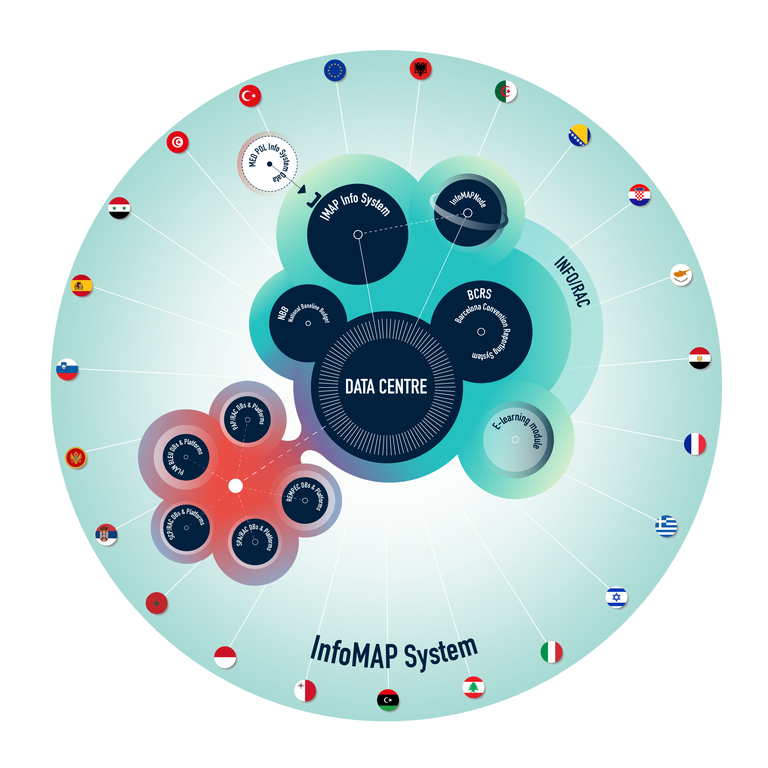
Towards the MAP Data Policy implementation in the Mediterranean
For the first time the Barcelona Convention has its own Data Policy, developed by INFO/RAC and approved by the Contracting Parties at the end of 2021 (COP21 – Turkey).
It is a success of the whole MAP Barcelona Convention System, neverthless some ...
For the first time the Barcelona Convention has its own Data Policy, developed by INFO/RAC and approved by the Contracting Parties at the end of 2021 (COP21 – Turkey).
It is a success of the whole MAP Barcelona Convention System, neverthless some steps more still need to be achieved.
With the approval of the general MAP Data Policy in the Mediterranean Sea, it is opening a new phase of bilateral negotiations with INFO/RAC to define and tune the levels of access to the various datasets and data flows.
In the current biennium, Contracting Parties, MAP CU, RACs and Mediterranean experts will cooperate with INFO/RAC in order to identify the datasets to share as public without restrictions and the ones that will be aggregated to be used for the preparation of reports on sustainability and on the state of the marine-coastal environment.
Bilateral meetings with the Contracting Parties will allow the understanding of the national data policies, the definition of a digital transition plan and data embargo rules to bring most of the data to a free license and to identify the rules of sharing and usability for those data that cannot be liberalized. Consequently, a matrix of access levels will be defined for each category of identified datasets, in order to classify the various access rights and use of the data at the various user levels (thematic expert, Thematic Focal Point, Map Focal Point, RACs, citizens).
All the further agreed elements will be part of an Annex developed for each data flow, including possible exclusive and data protection agreements to better articulate roles and responsibilities. The document “Data Management policy”, already approved at the COP21 about the technical rules for sharing the data will guide the definition of the collection and storage formats some data.
In conclusion the process of implementation of the MAP Data Policy has just started and in the coming years each Contracting Party is invited to adapt its data to the sharing policies in place and make available the datasets into the InfoMAP system managed by INFO/RAC in order to make it effective and create a long-term decision support system for the environmental and clime protection.
